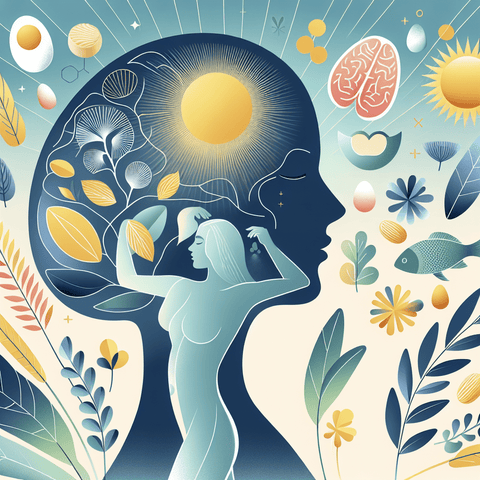Introduction
In the modern landscape of health and wellness, nutritional supplements have gained significant recognition for their role in supporting various aspects of physical and mental well-being. As scientific research deepens our understanding of the complex interplay between nutrients and mental health, one vitamin has stepped into the spotlight—Vitamin D3. Historically known for its vital contribution to bone health and calcium regulation, emerging evidence suggests that Vitamin D3 may have far-reaching effects beyond the skeleton, extending into brain function and mood regulation.
Understanding how nutrition influences mental health is crucial in developing holistic approaches to wellness. Nutritional deficiencies and imbalances are increasingly linked with mental health conditions such as depression, anxiety, and mood disorders. Vitamin D3, in particular, has garnered attention for its potential role in mitigating these issues by modulating neurotransmitter activity, reducing inflammation, and supporting neuroplasticity. This post aims to explore the fascinating connection between Vitamin D3 and mental health, revealing how optimizing its levels could be an integral part of maintaining emotional resilience and overall psychological well-being.
Vitamin D3: A Critical Nutritional Supplement for Brain Vitality
Vitamin D3, or cholecalciferol, is a fat-soluble vitamin essential for numerous biological processes. Unlike other forms of vitamin D, such as D2 (ergocalciferol), Vitamin D3 is naturally synthesized in human skin through exposure to ultraviolet B (UVB) radiation from sunlight. Once produced or ingested through diet or supplements, Vitamin D3 is first converted in the liver to 25-hydroxyvitamin D, the primary circulating form. It subsequently undergoes further hydroxylation in the kidneys to become its active form, 1,25-dihydroxyvitamin D, which binds to vitamin D receptors (VDRs) found throughout the body, including in the brain.
Sources of Vitamin D3 include limited dietary options such as fatty fish (salmon, mackerel, sardines), egg yolks, liver, and fortified foods. Due to limited natural food sources, supplementation and sunlight exposure are critical for maintaining adequate levels. Unfortunately, Vitamin D3 insufficiency and deficiency are prevalent globally, spanning all age groups and demographics. Factors such as geographical location, cultural practices, skin pigmentation, lifestyle habits, and age influence body synthesis and intake of Vitamin D3, resulting in widespread deficiencies that could impact health beyond bone density.
The biological mechanisms through which Vitamin D3 influences brain function are complex and multifaceted. Once activated, Vitamin D interacts with VDRs expressed in various brain regions—including the cortex, hippocampus, and cerebellum—indicating a role in cognitive and emotional processes. It modulates gene expression involved in neuroprotection, neuroplasticity, and neurotransmitter synthesis. Additionally, Vitamin D3 influences calcium homeostasis within neurons, affecting synaptic activity and signaling pathways involved in mood regulation. Through these pathways, Vitamin D3 becomes a vital component in maintaining optimal brain vitality and resilience against mental health disturbances.
Mental Health Benefits of Vitamin D3
Accumulating scientific evidence underscores the significance of Vitamin D3 in mental health. Numerous studies have demonstrated correlations between low Vitamin D levels and increased symptoms of depression and anxiety. For instance, individuals with diagnosed depression often exhibit lower circulating levels of 25-hydroxyvitamin D compared to healthy controls. While correlation does not imply causation, these findings suggest that adequate Vitamin D3 status may play a protective or supportive role in emotional well-being.
Vitamin D3 profoundly influences neurotransmitter production, particularly serotonin and dopamine—neurochemicals critical for mood regulation. Serotonin, often dubbed the "feel-good" neurotransmitter, is pivotal in regulating happiness, focus, and emotional stability. Vitamin D3 modulates the expression of tryptophan hydroxylase enzymes, which are essential in serotonin biosynthesis. This regulation hints at a potential pathway through which Vitamin D3 impacts mood and mental health. Furthermore, dopamine pathways, associated with motivation and reward, also appear to be affected by Vitamin D3 levels, suggesting a broader influence on emotional states and behavior.
Clinical studies exploring the effects of Vitamin D3 supplementation have yielded promising results. Randomized controlled trials have reported reductions in depressive symptoms following Vitamin D3 supplementation, particularly among individuals with baseline deficiencies. For example, some studies indicate that supplementing with doses of 1,000-5,000 IU per day can improve mood scores, especially in populations at risk for deficiency. These findings reinforce the notion that maintaining optimal Vitamin D3 levels could be a valuable adjunct to mental health treatments, contributing to improved psychological resilience and reduced symptom severity.
While more research is necessary to establish definitive causal relationships, accumulating data support the potential of Vitamin D3 as a supportive agent in managing mood disorders. Its safety profile and broad biological effects make it an attractive candidate for integrated mental health approaches. Ensuring sufficient Vitamin D3 intake, therefore, might serve as a simple yet impactful strategy to bolster mental wellness, reduce the burden of mood-related symptoms, and improve quality of life.
Mood Regulation Support Through Vitamin D3 Supplementation
The brain’s complex network of regions responsible for mood regulation—such as the limbic system, prefrontal cortex, and hypothalamus—are influenced by Vitamin D3. Through interactions with VDRs in these areas, Vitamin D3 contributes to the regulation of neurochemical activity, neurogenesis, and neuroplasticity—fundamental processes underlying emotional stability. Adequate Vitamin D3 levels support the optimal functioning of these circuits, helping to prevent mood dysregulation.
Sleep quality and circadian rhythm stability are vital components of mood regulation. Vitamin D3 influences the production of connected hormones and neurotransmitters, like melatonin and serotonin, which govern sleep-wake cycles. Disrupted circadian rhythms are associated with increased vulnerability to depression and anxiety; thus, maintaining sufficient Vitamin D3 levels can promote healthier sleep patterns, thereby stabilizing mood and enhancing overall mental resilience.
To harness these benefits, individuals should consider dosage and timing strategies for Vitamin D3 supplementation. Typically, doses of 1,000 to 4,000 IU daily are considered safe and effective for most adults, but personalized dosages should be determined based on blood levels and healthcare recommendations. Timing can also matter; taking Vitamin D3 with meals containing healthy fats enhances absorption. Some people report improved mood and energy when supplementing in the morning, aligning with natural circadian rhythms.
Personal anecdotes further reinforce the positive impact of Vitamin D3 on mood. Many individuals share stories of feeling more balanced, energized, and emotionally stable after correcting deficiencies. These testimonials, coupled with scientific evidence, underscore the importance of recognizing Vitamin D3 as a potential tool for supporting mental health and fostering a more positive outlook on life.
Addressing Vitamin D3 Deficiency as a Priority for Mental Wellness
Recognizing the signs of Vitamin D3 deficiency is crucial. Common indicators may include persistent fatigue, low mood, difficulty concentrating, and feelings of hopelessness—all symptoms that overlap with various mental health conditions. Specific deficiency symptoms related to mental health may manifest as increased mood swings, irritability, and social withdrawal, emphasizing the importance of monitoring Vitamin D levels as part of a comprehensive wellness assessment.
Factors that contribute to deficiency encompass geographical location—particularly regions with long winters and limited sunlight exposure—skin pigmentation, which affects UVB absorption, and lifestyle choices such as indoor living and use of sunscreen. Age is also a factor, with older adults experiencing decreased skin synthesis capacity. These risk factors highlight the importance of testing and assessing Vitamin D3 levels to tailor supplementation appropriately.
Accurate testing through blood serum 25-hydroxyvitamin D concentration is the most reliable method to determine Vitamin D status. Many healthcare providers recommend testing at regular intervals, especially for individuals with known risk factors. Achieving and maintaining levels within the optimal range (generally 30-50 ng/mL) can potentially support mental health and prevent deficiency-related issues.
Strategies to correct deficiency include dietary modifications, safe sun exposure—such as 10-30 minutes of midday sun several times per week—and supplementation protocols. Combining these approaches ensures a holistic strategy to restore adequate Vitamin D3 levels, promoting not only skeletal health but also mental vitality.
Psychological Well-Being and Vitamin D3’s Broader Impact
Maintaining optimal Vitamin D3 levels is associated with enhanced psychological resilience. Adequate Vitamin D3 supports the body's ability to cope with stress, reduces feelings of anxiety, and fosters a sense of emotional stability. This is partly due to its role in regulating inflammatory responses. Chronic inflammation has been linked to depression and other mental health disorders; thus, Vitamin D3’s anti-inflammatory properties can be protective against mental health disturbances.
Additionally, Vitamin D3 may influence the hypothalamic-pituitary-adrenal (HPA) axis, a central stress response system. Proper functioning of the HPA axis is essential for managing stress, and Vitamin D3 appears to modulate this system’s activity, promoting resilience during stressful periods. Combined with practices such as mindfulness, exercise, and therapy, Vitamin D3 can be an important aspect of a comprehensive mental health strategy.
Integrative approaches that combine Vitamin D3 supplementation with other therapeutic modalities—such as psychotherapy, counseling, and lifestyle modifications—may provide the best outcomes. Emphasizing a holistic approach, this strategy underscores the importance of nutrition’s role in mental health maintenance and recovery.
Neuroprotective Properties of Vitamin D3 and Its Relevance to Brain Health
Beyond mood regulation, Vitamin D3 demonstrates neuroprotective effects, supporting neuronal growth and differentiation. Research indicates that Vitamin D3 promotes the survival of neurons, encourages neurogenesis, and reduces oxidative stress—all of which are fundamental in preserving brain integrity. It also enhances the production of neurotrophic factors, which support the growth and maintenance of neurons.
These properties are particularly relevant in the context of neurodegenerative diseases like Alzheimer’s and Parkinson’s, which often involve cognitive decline and mood disturbances. While more research is needed, preliminary evidence suggests that maintaining adequate Vitamin D3 levels might help delay or mitigate neurodegenerative processes, thereby protecting mental and cognitive health over the lifespan.
Neurological studies have observed that high concentrations of Vitamin D3 are associated with better cognitive outcomes and reduced risk of neurodegenerative pathology. Future research directions include exploring the potential of Vitamin D3 as an adjunct therapy or preventive supplement for brain health, especially in aging populations.
Practical Guidelines for Incorporating Vitamin D3 into Your Mental Health Routine
To effectively incorporate Vitamin D3 into your mental health regimen, understanding the recommended daily intake and safe supplementation practices is critical. The general guideline for adults suggests a daily intake of 600-800 IU, but many individuals with deficiency require higher doses—often 1,000–4,000 IU—under healthcare supervision. Regular testing ensures levels remain within the optimal range, preventing potential toxicity.
Combining Vitamin D3 with other essential nutrients amplifies its benefits. For example, Vitamin K2 cooperates with Vitamin D3 to regulate calcium metabolism and support vascular health. Magnesium, found in [Magnesium Benefits for Energy and Support](https://www.topvitamine.com/collections/magnesium-benefits-energy-muscle-bone-support), plays a role in activating Vitamin D3 within the body. Omega-3 fatty acids like DHA and EPA, available in [DHA/EPA/Omega-3 Supplements](https://www.topvitamine.com/collections/dha-epa-omega-3-supplements), also contribute to brain health and mood regulation.
Monitoring Vitamin D3 levels through blood tests, especially after starting supplementation, ensures safety and efficacy. Avoid toxicity by adhering to recommended doses and consulting healthcare providers. Lifestyle practices—such as regular outdoor activity, spending time in sunlight, and consuming Vitamin D-rich foods—naturally boost levels and complement supplementation efforts.
Conclusion
In summary, Vitamin D3 is a vital nutrient with significant implications for mental health and mood regulation. Its influence extends from neurotransmitter synthesis and neuroprotection to inflammation modulation and circadian rhythm support. Ensuring sufficient Vitamin D3 levels through safe sun exposure, diet, and supplementation can promote emotional stability, improve resilience to stress, and support overall brain health. As research continues to unravel the complexities of the brain-nutrient connection, prioritizing Vitamin D3 optimization emerges as an accessible, evidence-based approach to enhancing mental well-being.
Taking proactive steps to assess and improve your Vitamin D3 status—working closely with healthcare providers—can empower you to take charge of your mental health in a holistic, informed manner. Remember, a healthy mind begins with a nourished brain, and Vitamin D3 might just be the nutrient your brain needs to function at its best.
Q&A Section
Q1: How does Vitamin D3 influence mental health?
Vitamin D3 supports mental health by regulating neurotransmitter synthesis, reducing inflammation, and promoting neuroplasticity. It influences brain regions involved in mood regulation and helps maintain circadian rhythms and sleep patterns, which are essential for emotional stability.
Q2: What are common signs of Vitamin D3 deficiency related to mental health?
Signs can include persistent fatigue, low mood or depression, irritability, difficulty concentrating, feelings of hopelessness, and social withdrawal. Recognizing these symptoms can prompt testing and corrective action.
Q3: How can I safely supplement with Vitamin D3?
The typical safe dosage ranges from 1,000 to 4,000 IU daily, but personalized dosing should be determined by blood tests and healthcare consultation. Monitoring levels periodically helps prevent toxicity and ensures optimal benefits.
Q4: Can I improve my Vitamin D3 levels naturally?
Yes, exposure to safe sunlight (10-30 minutes several times per week), dietary intake of fortified foods and fatty fish, and lifestyle modifications like outdoor activities can naturally boost Vitamin D3 levels.
Q5: Should Vitamin D3 be combined with other nutrients?
Absolutely. Combining Vitamin D3 with Vitamin K2, magnesium, and omega-3 fatty acids can enhance its effectiveness and promote overall brain and body health. Explore options like [Magnesium Benefits](https://www.topvitamine.com/collections/magnesium-benefits-energy-muscle-bone-support) and [DHA/EPA Supplements](https://www.topvitamine.com/collections/dha-epa-omega-3-supplements) for comprehensive support.
Important Keywords
- Vitamin D3 and mental health
- Mood regulation and Vitamin D
- Vitamin D deficiency symptoms
- Vitamin D supplementation
- Neuroprotective effects of Vitamin D3
- Supplements for brain health
- Sun exposure and Vitamin D
- Neurotransmitter synthesis and Vitamin D
- Mental resilience and Vitamin D3
- Holistic mental wellness strategies



